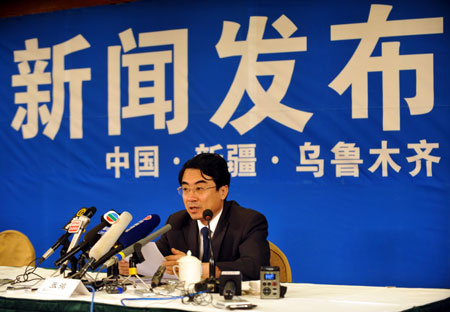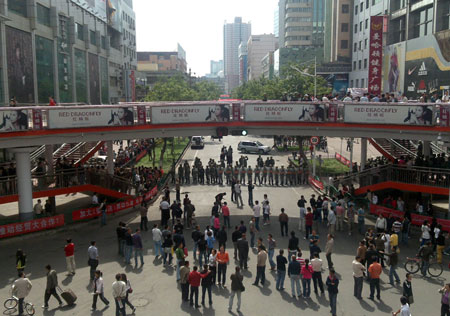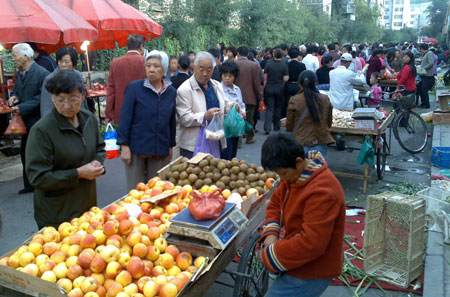A senior government official said Friday the situation in Urumqi, the capital city of northwest China's Xinjiang Uygur Autonomous Region, was under control after local residents had taken to the streets over two days to protest against hypodermic syringe attacks.
 |
|
Deputy Mayor of Urumqi Zhang Hong speaks during a news conference in Urumqi, capital city of northwest China's Xinjiang Uygur Autonomous Region, Sept. 4, 2009. Zhang Hong said on Friday the situation was basically under control in the city. [Xinhua] |
There were no major protests in the city Friday, a day after massive protests that left five people dead Thursday, said Executive Deputy Mayor Zhang Hong.
Small crowds gathered "in a few locations" Friday, but soon dispersed and nobody was killed, said Zhang.
Syringe attacks carried out since Aug. 20 have resulted in panic and resentment from the public, the official said.
Suspects were caught Wednesday when attacking members of the public. They were beaten by a angry crowd and one was seriously injured.
Five people have been confirmed dead and 14 others injured and hospitalized following Thursday's protests, Zhang said.
 |
|
People gather on a street in Urumqi, capital of northwest China's Xinjiang Uygur Autonomous Region, Sept. 4, 2009. Police were exerting efforts to control the situation in Urumqi on Friday. [Xinhua] |
Of the five dead, two had been confirmed as innocent civilians, while police are trying to identify the remaining three.
He said investigations showed those carrying out the syringe attacks were from the Uygur ethnic group while the attacked included Han Chinese and other ethnic groups.
By Thursday, local hospitals had dealt with 531 victims of hypodermic syringe stabbings, 106 of whom showed obvious signs of needle attacks.
Zhang said the attacks were premeditated and organized to create terror in society.
 |
|
Residents go around at a market on Meiqi Lane in Urumqi, capital city of northwest China's Xinjiang Uygur Autonomous Region, Sept. 4, 2009. [Xinhua] |
"The 'three forces' (separatism, terrorism and extremism) at home and abroad are not willing to see ethnic unity and their failure when the July 5 violence died down quickly," he said. "So they are using 'soft violence' to disrupt social order and instigate ethnic hatred."
China's Public Security Minister Meng Jianzhu arrived in Urumqi Friday to direct work to defuse ongoing unrest in the city.
Meng, also a State Councillor, urged local governments and Communist Party of China (CPC) committees at all levels in Xinjiang "to restore social order as soon as possible."
"Maintaining stability is the central task of overriding importance in Xinjiang at the present time," he said in a meeting with local officials.
Meng said the spate of syringe attacks, which were premeditated, masterminded and conducted by law-breakers and instigated by ethnic separatist forces, were a continuation of the July 5 riot in the city which left 197 people dead. He said the separatists' purpose was to undermine ethnic unity.
(Xinhua News Agency September 5, 2009)